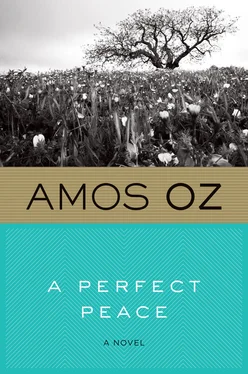It took Tia two weeks to recover from her sores. She was again drowsing by the heater. One evening, when she stopped breathing for a moment in her sleep, Yonatan was terrified that she might have slipped away. Once he discovered it was a false alarm, he made up his mind: Tomorrow night.
That same night a young man arrived at the kibbutz. He had walked all the way from the main road, a distance of six kilometers, and entered the village by way of the muddy tractor road that passed the farm buildings. He soon enough encountered the smells of the place — the sour fumes of the poultry run, the stench of the sheepfold, the pungent rot of wet hay, the fetid stink of cow manure and a plugged sewage pipe by the barn, the bubbly ferment of moldy orange peels in the slop pile.
The first person to run across him in the fading twilight was Etan R., who was carrying fodder to the feedstalls in the cowshed. Noticing a thrusting, scrambling movement in the thick bushes behind the fertilizer shed, Etan surmised that another calf had escaped from the cow pen and the thought of it made him hopping mad.
That latch came loose again because Stutchnik forgot to fix it and I didn't wire the gate shut. Only this time, for a change, I'm not going to do a thing about it. No, I'm going to go yank that Stutchnik right out of his Jewish philosophy group in the lecture hall and haul him down here in his best clothes to take care of his own mess. I don't give a damn. It's the second one broken loose this week, and Stutchnik is going to lose his chance to sound off any more about how careless we all are and about how the young ones are going to seed from too much easy living. But hold on, that's not a calf.
The young stranger came plunging out of the bushes face first, followed by shoulders and hands, the latter frantically pushing the wet foliage aside. He was wearing corduroy pants and a short, light-colored jacket, and he appeared to be running straight for Etan R., who was tempted for a second to trip him up and get in the first blow, but the stranger suddenly stopped in his tracks and stood there wet and shivering. He must have come a long way in the rain before getting lost in the underbrush. The water that streamed down his cheeks from his soaking-wet hair made him look pitiful. Over one shoulder hung a skimpy army knapsack; one hand held a large guitar case.
Etan R. eyed the newcomer. He was hardly more than a boy, skinny, with narrow, sharply slanting shoulders, and so unsteady on his feet that a modest push would have been enough to knock him down. Etan's initial apprehensions gave way to a feeling of mild impatience. A large, blond, hairy man, pug-nosed and lantern-jawed, he planted his heavy work boots far apart and stared hard at the newcomer before finally speaking.
"Good evening."
The two words sounded more like a question than a greeting, because Etan still regarded the stranger as very strange indeed.
The young man flashed a quick, overly broad smile that vanished at once, replied good evening in a vaguely foreign accent, and inquired where he might find the head of the kibbutz.
"You mean the secretary of the kibbutz. The secretary is sick," said Etan R. in his imperturbably slow voice.
"Of course," replied the young man, as if the merest child would have known that kibbutz secretaries were prone to ill health. "Of course," he repeated. "I understand quite well and wish him a speedy recovery! But responsibility on the kibbutz, if I'm not mistaken, is collective. There must be a deputy, or someone on temporary duty."
Etan R. nodded his massive head several times. He was sufficiently amused to be on the verge of smiling, but his amusement faded when he caught a better glimpse of the young man's face with its sharp green look bordering equally on gaiety and despair, the eyes nervously blinking. There was, in fact, something tense, frightened, and, at the same time, fawning about his whole demeanor, something almost cunningly submissive. Etan R. refrained from smiling, and said in a harsh military voice, "All right, then. What can I do for you." This time there was not even the hint of a question.
The young man did not reply at once, as if he had instantly grasped that the secret of Etan's superiority lay in delaying one's answer and had decided to play the same game himself. He hesitated, shifting his guitar case from his right hand to his left. Then, with an abruptly decisive movement, he stretched his hand and said:
"Hello there. I'm pleased to meet you. My name is Azariah Gitlin. I'd like to stay here. I mean live here. The only justice left today is on the kibbutz. You won't find it anywhere else. I'd like to live here."
Etan had no choice but to grasp the hand held out to him.
Azariah Gitlin responded at once.
"Look, comrade, I don't want to be misunderstood from the start. I'm definitely not one of those people who come to a kibbutz with all kinds of personal problems and expect to find heaven on earth. But you people still relate to each other. Everywhere else in the world there's nothing but hatred and envy and cruelty. That's why I've come. I want to join you and change my life for the better. And in relating to others, I believe, one relates better to one's own inner self. So I would like, if I may, to speak to whoever is in charge."
A foreign accent. Unable to place it, Etan felt his impatience grow. The spot where they were standing, on a slope on the edge of the settlement, was deserted. Some thirty meters beyond them was the perimeter fence, through whose rusty coils of barbed wire a dim light showed. The concrete path at their feet was covered with a layer of muck. Every step squished and gurgled with a foul, suppurating sound.
Once, Etan R. recalled, Stutchnik had told him about some student living on the kibbutz thirty years ago who had run amuck with a revolver and fired at anyone who came near him.
A wind was blowing. The air was raw. Frost-stricken lawns on the hillside were gradually sinking into darkness. Shade trees mourned their lost leaves. Even the nearest houses seemed to be not near the two men, but far away and far apart. Mist rose from the large puddles of water at the bottom of the hill. A girl laughed somewhere in the distance.
The young man shifted the guitar case back to his right hand. Etan R. bent his head to make out the time on his watch. His work clothes reeked of sweat, sour milk, and manure.
"All right," said Etan. "That's fine."
"It's all right? I can stay? I'm ready to start work tomorrow. Any work. I have all my papers with me, and a letter of recommendation."
"Hold on a minute," said Etan R. "Look. Follow that path until you reach the bakery. There's a sign on the bakery that says bakery. That's how you know it's the bakery. Just past the bakery there's a fork. Bear left along the cypress trees. When you get to the end of them you'll see two houses. Is that clear so far?"
"So far it's fantastic."
"Hold on a minute. Don't run off. I'm not done yet. When you get to the two houses, cut between them. You'll see a long, raised building with four porches. Past it you'll see a second building, also on pilings with four porches. Knock on its next-to-last door. That's Yolek's. Yolek is the secretary. He's your man, the head of the kibbutz you said you were looking for."
"The man you said was critically ill?"
"Ill. I don't know about the critical. One look at you will revive him. You'll get all your questions answered, and he'll tell you what to do. Are you sure you won't get lost?"
"Never!" answered Azariah in a pale fright, as though he had just been asked whether he intended to make off with something valuable. "In the army I was almost sent to a special reconnaissance course. Well, it was a pleasure meeting you. 'The smiling face is hard to erase,' they say. My name is Azariah. Will you allow me to thank you?"
Читать дальше












